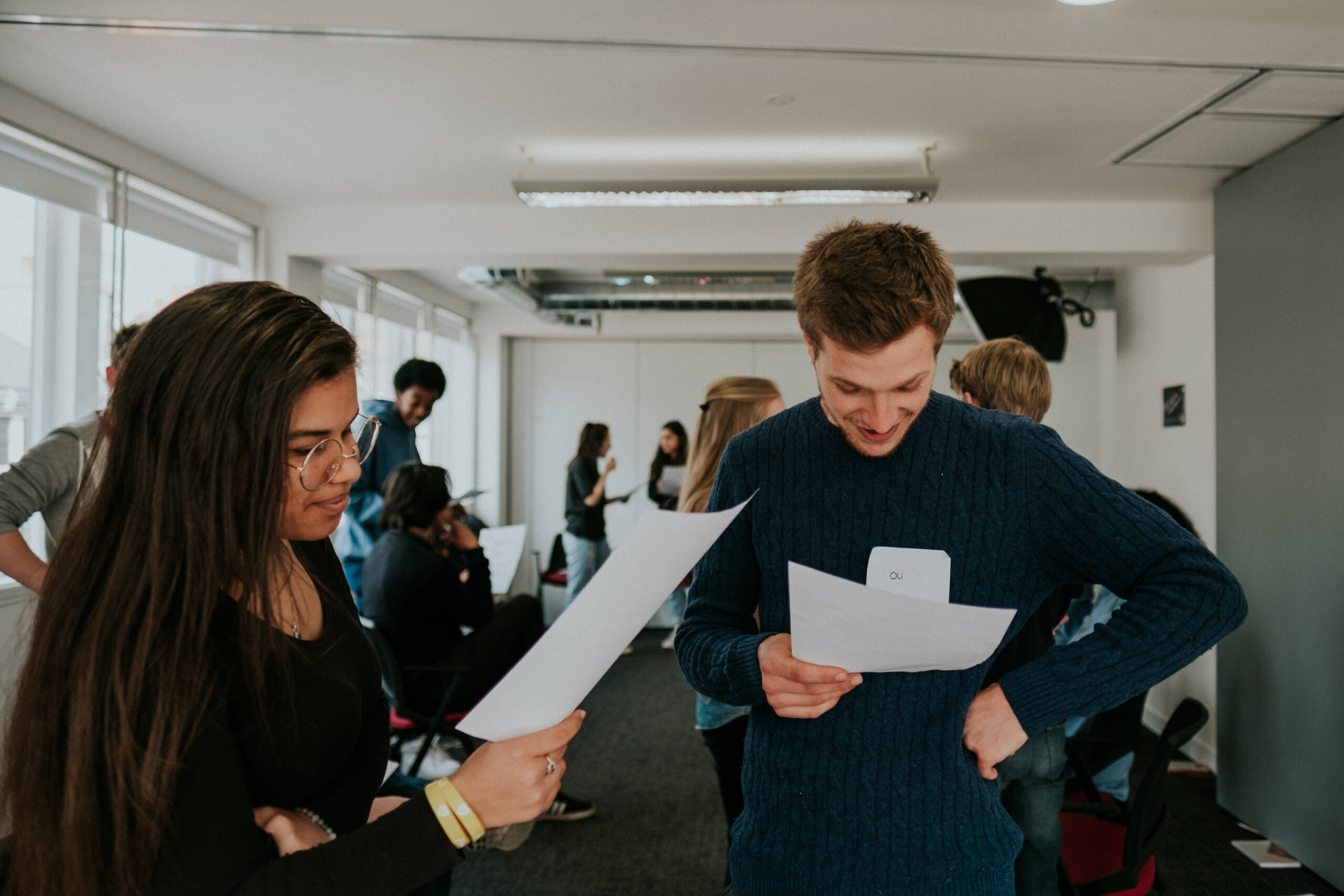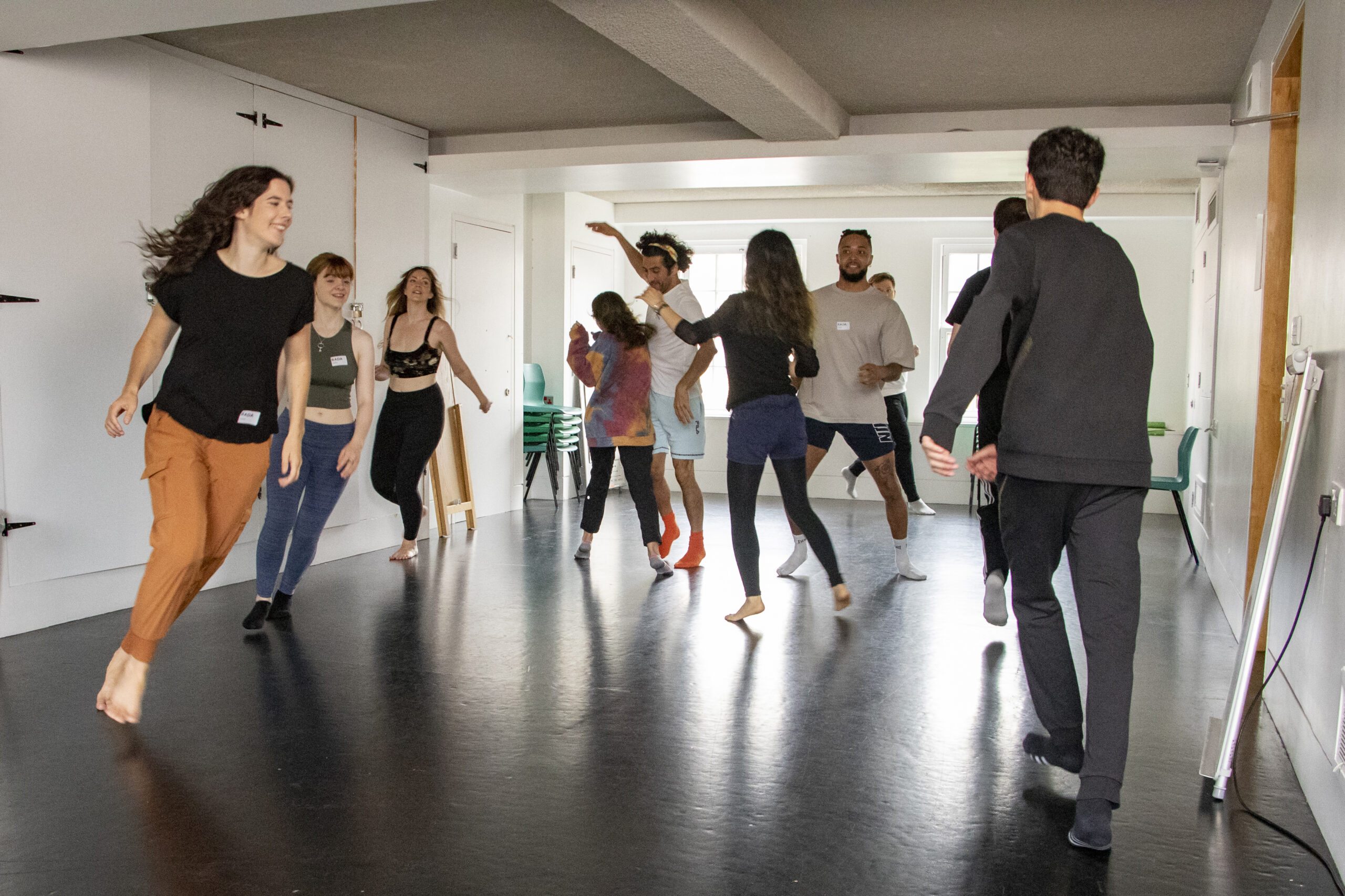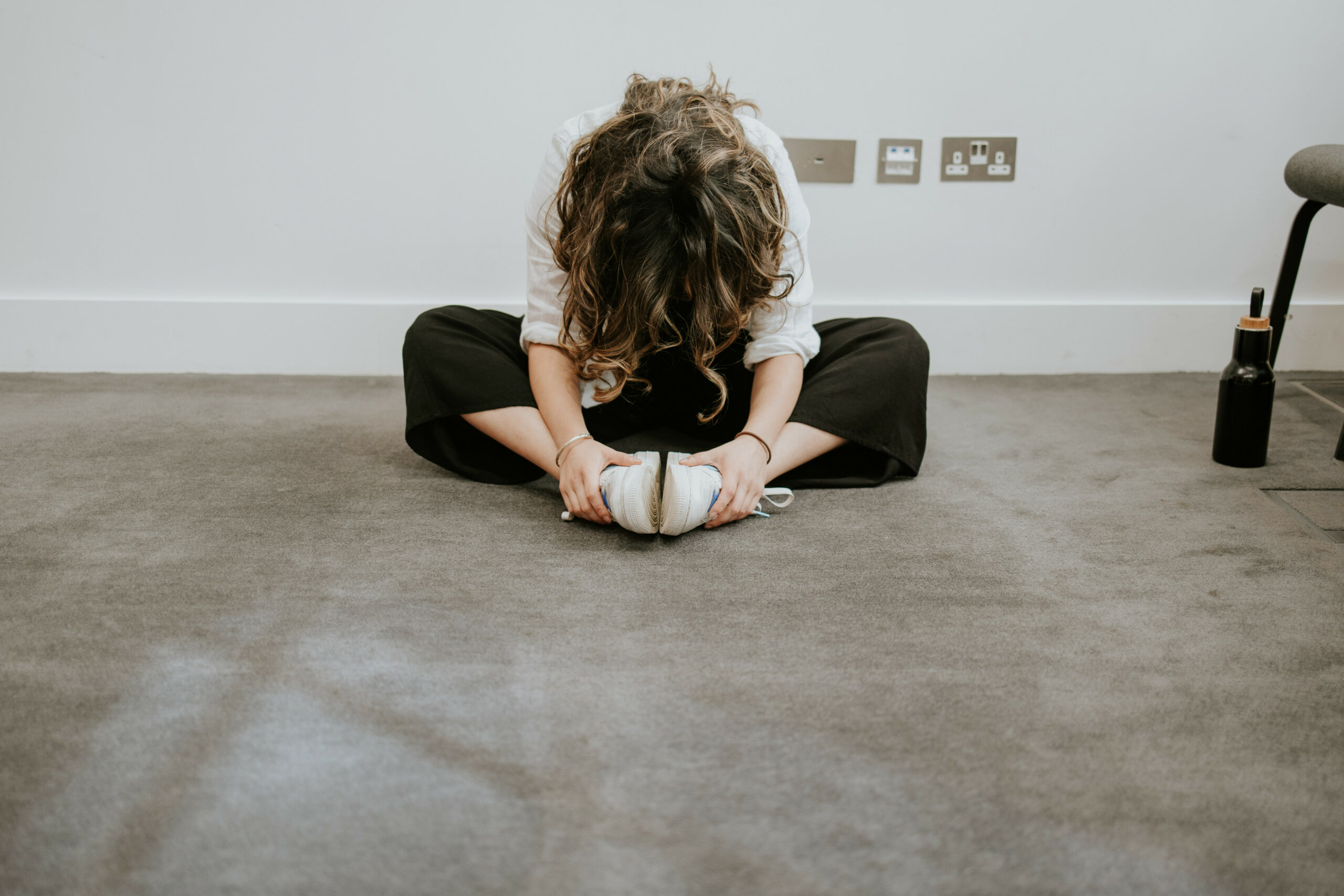Actors Katie Redford and Katie Elin-Salt discuss the ins and outs of drama school training, comparing their experiences
Somehow, by the good grace of Liza Minnelli, I was offered a place at Royal Welsh College and I shot off with my tap shoes in hand quicker than you could say: “You don’t need tap shoes, it’s a straight acting course.”
I auditioned for a little pantomime and successfully landed the role of “carrot” in Jack and the Beanstalk and well, it’s just been jazz hands ever since… The general consensus was that if you liked drama, you taught it. But I knew I wanted to become an actress…
Once upon a time, there were two actresses, both called Katie.
Both moved to London from their hometowns to pursue their acting dream.
Both love cake.
Both write for Spotlight.
Both have been party princesses to pay the bills (Oh come off it, who hasn’t nowadays?).
Both are currently working, but both have had stints out of work.
One of the only differences between them: one went to drama school and the other didn’t.
As an actor branching out, do you have to go to drama school? It’s a question that brings up so many different questions so we thought we’d share our own personal experiences with you.
Why did you go to drama school?
Katie Elin-Salt: My school didn’t have a drama department and when my mother found out the cost of the local high end franchise weekend drama school (you know the one), she nearly fainted. So when an affordable youth theatre opened up nearby, I ran there as fast as my little legs could carry me, demanding an audition. I was successful in gaining the famous role of “a tree” in their production.
Years later, a brilliant drama teacher at my youth theatre told me about drama school and encouraged me to give it a go. Being working class and a woman, I felt cripplingly aware of the unlikeliness of success so I applied for sensible, achievable degrees and universities alongside a few drama schools, just in case. Somehow, by the good grace of Liza Minnelli, I was offered a place at Royal Welsh College and I shot off with my tap shoes in hand quicker than you could say: “You don’t need tap shoes, it’s a straight acting course.”
Why didn’t you go to drama school?
Katie Redford: I also grew up with an interest in performing and at the age of 5, joined a local theatre group. I auditioned for a little pantomime and successfully landed the role of “carrot” in Jack and the Beanstalk and well, it’s just been jazz hands ever since.
When I left college at 18, I moved from my hometown of Nottingham to London to go to university, where I did a 3-year acting degree. I don’t recall any of the drama teachers or career advisors at college ever discussing drama school to me. That, alongside the fact I was simply lazy with my research, contributes as one of the main reasons as to why I didn’t go. The general consensus was that if you liked drama, you taught it. But I knew I wanted to become an actress, I knew I wanted to learn but I also wanted the experience of being a university student, so a degree seemed like the best option at the time.
I feel like drama school has given me an excellent toolkit, which has stood me in good stead for my career. I learned how to use my voice properly, how to use my body to create characters, how to tackle Shakespeare and classical texts without feeling intimidated, how to work on modern texts, how to work with different casts and creative people.
Why was drama school for you?
Katie E-S: By the time I reached adulthood, the only theatre I had actually seen was whatever musical came into the New Theatre, Cardiff (Blood Brothers; eight times) and whatever musical my mother treated us to on our annual coach trip to London (Lion King; six times). I had absolutely no idea about theatre, television or how the industry worked and I remember sitting quietly on my first day of drama school like a rabbit in the headlights hearing those around me saying alien words like “Royal Shakespeare Company” and “Stanislavski” and realising I had better get a very, very big notepad.
Everything I learned about acting as an art form and about how to make it a career, every connection I made in order to make this achievable (getting an agent, getting to know UK theatre, production companies and important creative people), I learned at drama school. I needed that training because I wouldn’t have got it anywhere else.
I absolutely do not think this has to be the case even if you don’t have drama at your school. I now know that it is possible to educate yourself a lot more than I did and I would HIGHLY recommend you do so regardless of whether you are going to go to drama school or not. But I was totally clueless and I needed someone to sit me down and spell it all out for me. And this is what drama school did.
Why was drama school not for you?
Katie R: There were two occasions where I chose against going to drama school. The first time was accidental, due to my lack of knowledge/awareness, and the second time was due to the financial side of it.
A year after graduating from my degree, I decided to apply to do an MA at a drama school. Things were horribly quiet and nothing was quite panning out the way I thought it might. I’d gone from spending 3 years being creative, to suddenly serving burgers full time at a local burger joint. I then went travelling because, well, I didn’t want to serve burgers, but ran out of money and had to move back in with the parents while working full time in a bar. The DREAM.
I then decided to try a different avenue and began working in TV as a floor runner for various TV shows. It was a gruelling job; the hours were long (12-14 per day) and even though it was good to be working in the TV industry, it felt worse seeing what I so badly wanted to do, happening right in front of me. So, when I realised they weren’t going to cast the runner as the lead role in a new BBC drama, I applied for an MA at a drama school and secured a place. However, just 3 weeks before I was due to start, I pulled out. I simply felt too uneasy about spending £14,000 on a one year course.
Instead, I started training with the National Youth Theatre and landed a place in their REP company, however had to turn it down due to landing my first professional job, 4 years after graduating. I’d recently auditioned for the BBC Norman Beaton Fellowship, a scheme specifically run for actors who haven’t trained at accredited drama schools. I went on to win this and landed a 6-month contract with BBC Radio Drama.
I think without the contacts gained from a showcase/course in general, I was pushed to explore other avenues. Despite finding it gruelling at the time, I’m glad to have worked behind the scenes in TV. Even just from knowing general set etiquette, I feel as though my appreciation on set is far greater now as I’m fully aware of how much work it takes to make a show happen.
How have you benefitted from going to drama school?
Katie E-S: Drama school definitely gave me the connections I needed in order to make acting a career. I got my agent through drama school, I met important casting people at drama school and I worked with directors there who then went on to employ me professionally.
Aside from this, I feel like drama school has given me an excellent toolkit, which has stood me in good stead for my career. I learned how to use my voice properly, how to use my body to create characters, how to tackle Shakespeare and classical texts without feeling intimidated, how to work on modern texts, how to work with different casts and creative people. I trained in things like stage combat, which have come in very useful in my professional career.
How have you benefitted from not going to drama school?
Katie R: I wouldn’t say I’ve benefitted from not going, however I think I’ve benefitted from opportunities that arose elsewhere. Obviously winning the BBC NBF wouldn’t have happened if I’d gone to drama school, due to only being eligible to apply if you’ve not trained at an accredited drama school. One of my current jobs is for radio and I’m not sure how I’d have broken into that particular world without the scheme.
Also, I think without the contacts gained from a showcase/course in general, I was pushed to explore other avenues. Despite finding it gruelling at the time, I’m glad to have worked behind the scenes in TV. Even just from knowing general set etiquette, I feel as though my appreciation on set is far greater now as I’m fully aware of how much work it takes to make a show happen.
What are the challenges you’ve faced by going to drama school?
Katie E-S: Drama school can be very tough. It is incredibly emotionally and physically demanding. The hours are long and intense. You are thrown together with 20 strangers, 12 hours a day for 3 years solid, which brings its own challenges. You are constantly putting yourself out there, being given good and bad feedback on your abilities, which can at times be very hard to hear. A lot of people say drama school breaks you down in order to build you back up again and while I don’t completely agree, I do think I spent a lot of time questioning myself and coming across big hurdles along the way while I figured out who I wanted to be as a performer. Drama school is also financially demanding. I was lucky that for various reasons the drama school I went to cost me a lot less than most others, but sadly there were many courses that were completely out of reach for me due to my financial situation.
I also think drama school can lure you into a false sense of security if you’re not careful. The stark reality of a performer’s life hit me hard when I was suddenly out there on my own with bills to pay and daily rejection to deal with. One of the benefits of not going to drama school is that you learn how to deal with this reality from day one. You are having to make it happen for yourself and learn it all on your own and I will say that every successful performer I have met who hasn’t been to drama school is tough and wise as old boots.
What are the challenges you’ve faced by not going to drama school?
Katie R: There were quite a few, but they were mostly when I first started out. There is a sense of feeling as though you’re being frowned upon if you haven’t trained at an accredited drama school – I definitely felt like that anyway! When you’re first starting out and don’t have much work on your CV, at least if you have an accredited drama school on there, it’s something that casting directors and directors can associate with a stamp of approval. Without that, it feels slightly trickier.
Also, because my course didn’t have the reputation drama schools do, when it came to final year shows/showcases, we lacked contacts and industry professionals in attendance, which is a huge part of it all. Putting yourself out there and becoming known to directors since has felt like even more of a challenge.
Whichever route you end up taking, just have your wits about you. Stay grounded, don’t lose yourself in the hustle and bustle of it all and accept that you’re about to enter the most competitive, soul destroying yet incredibly exciting industry.
What would you advise people to do when deciding if drama school is for them?
Katie E-S: Do your research! This is the first of many big decisions you will have to make in your career as a self-employed person and you owe it to yourself to make an informed choice. Look up as many drama schools as you can, research their courses, go to their open days and have a real think about whether they seem like the right thing for you. If they do and you get a place – woohoo! If it doesn’t work out, that doesn’t mean you’re out of the running. It just means you have to do a bit of leg work on your own. But don’t worry, you are 3 years ahead of everybody else so you’ve got plenty of time!
Katie R: Do what you want to do, not what your career advisor thinks you should do. If you want to go to drama school, research as much as you can. The course, the location, the fees, the scholarships available, the number of people on the course, the careers of actors who have previously studied there, etc.
However, if you’re not sure you want to do the drama school route, there are other ways of performing whilst also making connections. I can’t rate organisations such as Triforce highly enough. They offer a platform called Monologue Slam, which is a chance for actors to be seen by a huge audience, including respectable casting industry professionals. Even just from doing one performance with them, there’s so much you can get out of it. The National Youth Theatre are also a brilliant organisation who offer a wide range of courses and also have great connections with industry professionals.
Whichever route you end up taking, just have your wits about you. Stay grounded, don’t lose yourself in the hustle and bustle of it all and accept that you’re about to enter the most competitive, soul destroying yet incredibly exciting industry. And without sounding too much like a fridge magnet, enjoy the journey rather than being constantly obsessed with the destination.
Thank you to Katie Redford & Katie Elin-Salt for their insight into the pros and cons of drama school training! If you want to know more, take a look at our articles on drama school, or check out this list of schools and get researching!
Katie Redford is an actress & writer originally from Nottingham, and part of the BBC New Talent Hotlist 2017. Katie won the BBC Norman Beaton Fellowship in 2015 via Birmingham Rep. She was part of the BBC Radio Drama Company and is now currently playing Lily Pargetter in BBC Radio 4’s The Archers and Ruby Tuliver in BBC Radio 4’s Home Front. She can also be heard as Layla in BBC Radio Comedy’s All Those Women.
Katie Elin-Salt is an actor, singer and musician from Bridgend in South Wales, now living in London. She trained at Royal Welsh College of Music and Drama and has done some nice bits of work over the last few years that she’s chuffed with. Aside from this, she’s most commonly known as Princess Elsa on weekends, and has also starred as Peppa Pig and Supergirl in various children’s parties across the UK. You may also recognise Katie from working in the returns section of Ann Summers Cardiff during Christmas 2010. Series regular of Judge Judy (playing ‘person watching it on the sofa whilst once again not in the gym’.)












